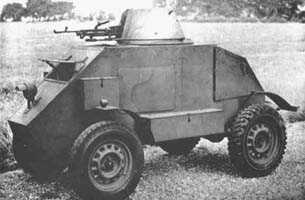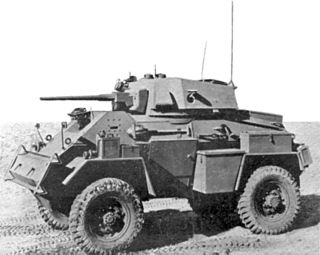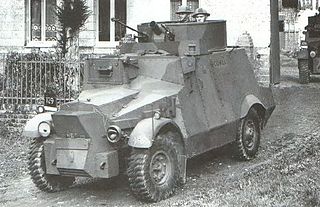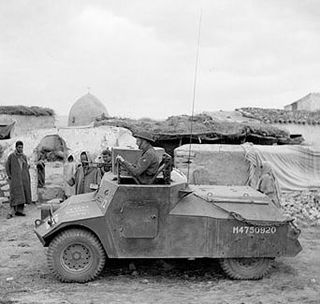 W
WAEC Armoured Car is the name of a series of British heavy armoured cars built by the Associated Equipment Company (AEC) during World War II.
 W
WAEC Armoured Command Vehicle was a series of command vehicles built by the British Associated Equipment Company (AEC) during the Second World War.
 W
WThe FV601 Saladin is a six-wheeled armoured car developed by Crossley Motors and later manufactured by Alvis. Designed in 1954, it replaced the AEC Armoured Car in service with the British Army from 1958 onward. The vehicle weighed 11 tonnes, offered a top speed of 72 km/h, and had a crew of three. Saladins were noted for their excellent performance in desert conditions, and found favour with a number of Middle Eastern armies accordingly. They were armed with a 76 mm low-pressure rifled gun which fired the same ammunition as that mounted on the FV101 Scorpion.
 W
WThe Austin Armoured Car was a British armoured car produced during the First World War. The vehicle is best known for its employment by the Imperial Russian Army in the First World War and by different forces in the Russian Civil War.
 W
WThe Bedford OXA was a British heavy armoured car, produced during the Second World War.
 W
WThe Combat Reconnaissance Vehicle (Wheeled), abbreviated to CVR(W) was a line of vehicles to replace the Ferret Armoured Car in British Army service.
 W
WThe Coventry armoured car (AFVW19) was a British four wheel drive armoured fighting vehicle developed at the end of the Second World War as a potential replacement for the lighter Humber and Daimler armoured cars.
 W
WThe Delaunay-Belleville armoured car was a British armoured car built on the chassis of the luxury French Delaunay-Belleville tourer. It saw service with the Royal Naval Air Service in the early years of the First World War.
 W
WThe FV721 Fox Combat Vehicle Reconnaissance (Wheeled) was a 4 × 4 armoured car manufactured by ROF Leeds, deployed by the British Army as a replacement for the Ferret scout car and the Saladin armoured car. The Fox was introduced into service with B Squadron, 1st Royal Tank Regiment in 1975 and withdrawn from service 1993–94.
 W
WThe Guy Armoured Car was a British armoured car produced in limited numbers during Second World War. The car saw limited action during the Battle of France.
 W
WThe Hillman Gnat was an experimental World War II era light armoured car developed in Britain.
 W
WThe Humber Armoured Car was one of the most widely produced British armoured cars of the Second World War. It supplemented the Humber Light Reconnaissance Car and remained in service until the end of the war.
 W
WThe Humber Light Reconnaissance Car, also known as Humberette or Ironside, was a British armoured car produced during the Second World War.
 W
WThe Lanchester 6x4 armoured car was a British armoured car with a 6x4 drivetrain produced in limited numbers in the late 1920s and early 1930s. A heavier, more rugged development of the earlier Lanchester 4x2 armoured car, it remained in service with Territorial and colonial units until the early 1940s and saw action in the Battle of Malaya.
 W
WThe Lanchester armoured car was a British armoured car built on the chassis of the Lanchester "Sporting Forty", it saw wide service with the Royal Naval Air Service and British Army during the First World War. The Lanchester was the second most numerous World War I armoured car in British service after the Rolls-Royce armoured car.
 W
WThe Land Rover Tangi is a type of armoured vehicle, based on the Land Rover chassis and used in policing in Northern Ireland. They were used by the Royal Ulster Constabulary (RUC) and are currently used by their replacement, the Police Service of Northern Ireland (PSNI). The vehicle was designed and built in house by the Royal Ulster Constabulary's own engineers.
 W
WThe Morris CS9/Light Armoured Car was a British armoured car used by the British Army in the Second World War.
 W
WMorris Light Reconnaissance Car (LRC) was a British light armoured car for reconnaissance use produced by Morris Motors Limited and used by the British during the Second World War.
 W
WMotor Scout was the first armed petrol engine powered vehicle ever built. It was not intended for running over ploughed fields or charging but designed to provide a cover or support infantry and cavalry wherever good roads were available.
 W
WThe Simms Motor War Car was the first armoured car ever built, designed by F. R. Simms.
 W
WThe Force Protection Ocelot is a British armoured vehicle that replaced the United Kingdom's Snatch Land Rover with British forces. It received the service name Foxhound, in line with the canine names given to other wheeled armored vehicles in current British use such as Mastiff, Wolfhound, and Ridgeback, which are all variants of the Cougar.
 W
WDuring the First World War, sixteen American Peerless trucks were modified by the British to serve as armoured cars. These were relatively primitive designs with open backs, armed with a Pom-pom gun and a machine gun, and were delivered to the British army in 1915. They were used also by the Tsarist Russian Army as self-propelled anti-aircraft guns.
 W
WThe Pierce-Arrow armoured lorry was a heavy armoured car mounting a QF 3-pounder Vickers gun, it was used by the Royal Naval Air Service during the First World War.
 W
WThe Rolls-Royce Armoured Car was a British armoured car developed in 1914 and used during the First World War, Irish Civil War, the inter-war period in Imperial Air Control in Transjordan, Israel and Mesopotamia, and in the early stages of the Second World War in the Middle East and North Africa.
 W
WSC Group is a British multi-faceted engineering company which prior to a re-brand in September 2015 was known as Supacat Limited. Supacat was established in 1981 and based at Dunkeswell Aerodrome in England. SC Group now comprises four companies: Supacat, SC Innovation, Proteum and Blackhill Engineering.
 W
WThe Seabrook armoured lorry was a British heavy armoured car built on the chassis of an American 5-ton truck which saw service with the Royal Naval Air Service during the First World War.
 W
WThe Shorland is an armoured patrol car that was designed specifically for the Royal Ulster Constabulary by Frederick Butler. The first design meeting took place in November 1961. The third and final prototype was completed in 1964 and the first RUC Shorlands were delivered in 1966. They were reallocated to the Ulster Defence Regiment in 1970. The Royal Ulster Constabulary soon replaced the Shorland with an armoured Land Rover with more conventional profile and no machine gun turret.
 W
WThe Snatch Land Rover is a protected patrol vehicle based on the Land Rover Defender 110 chassis. Intended for general patrolling in low-threat areas, the vehicle was developed in 1992 for use in Northern Ireland. It provides a limited degree of small arms protection for occupants and a limited level of protection from Improvised Explosive Devices and off-route mines.
 W
WStandard Car 4x2, or Car Armoured Light Standard, better known as the Beaverette, was a British armoured car produced during the Second World War.
 W
WThe Talbot armoured car was a British armoured car built on the chassis of a Clément-Talbot tourer. Built in small numbers to several patterns, the Talbot armoured cars saw service with the Royal Naval Air Service (R.N.A.S.) in the early years of the First World War, serving alongside Rolls-Royce and Delaunay-Belleville armoured cars.
 W
WThe Vickers Crossley Armoured Car a/k/a the Model 25 Vickers Crossley armoured car, was a British-made military vehicle used by the British Army in India and exported to different countries, including Japan.